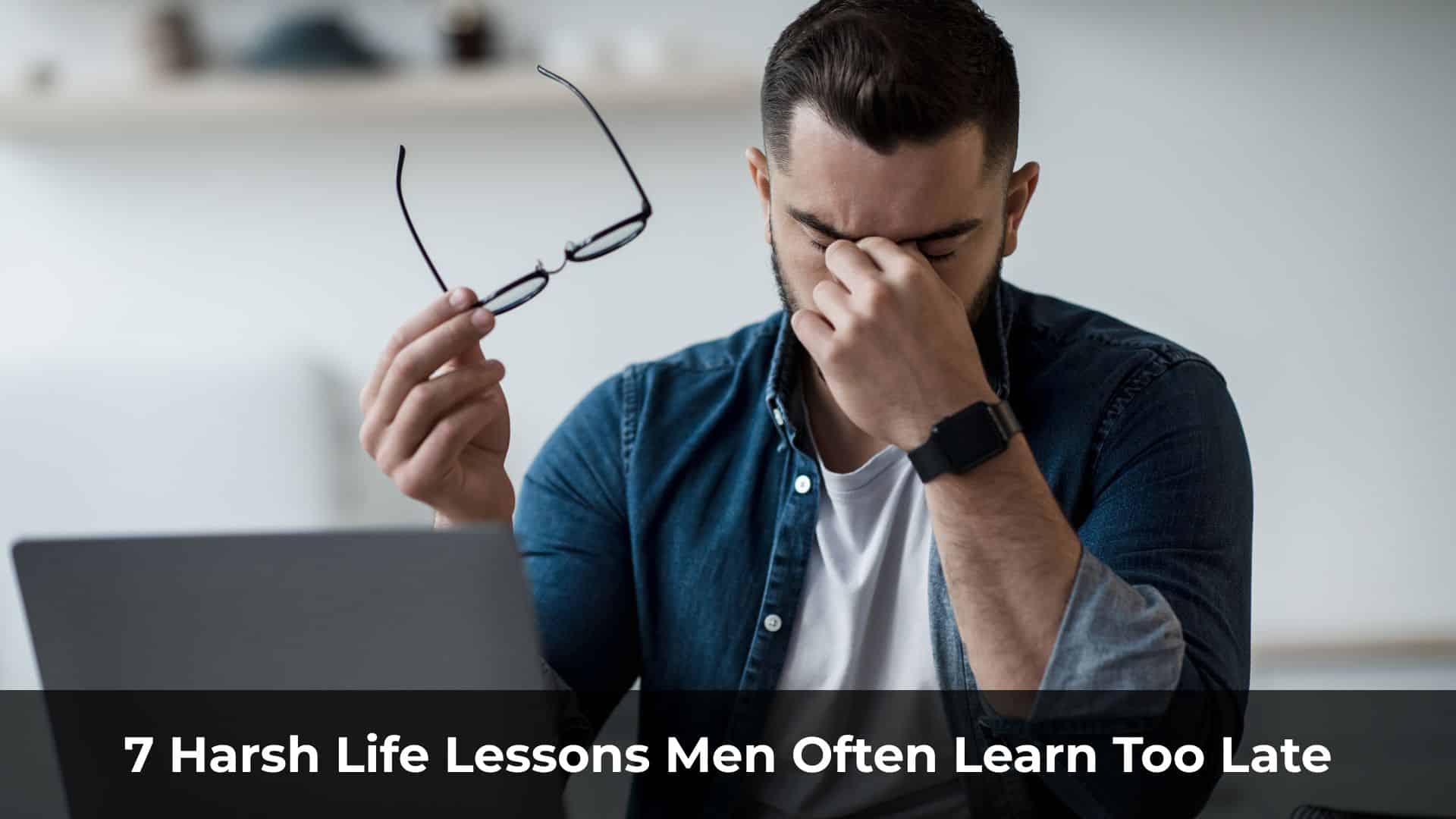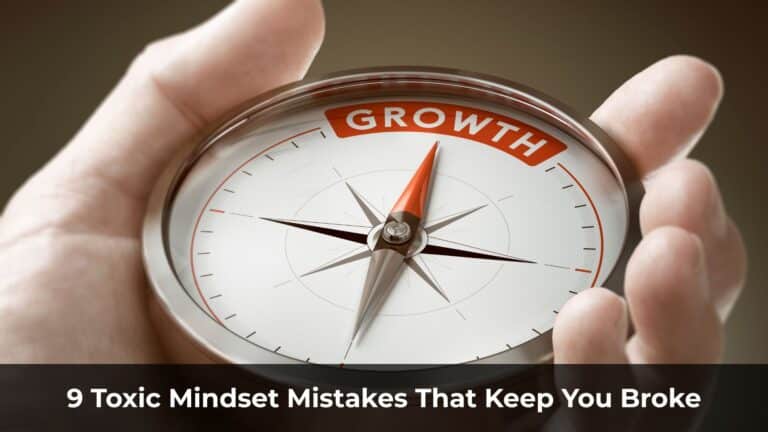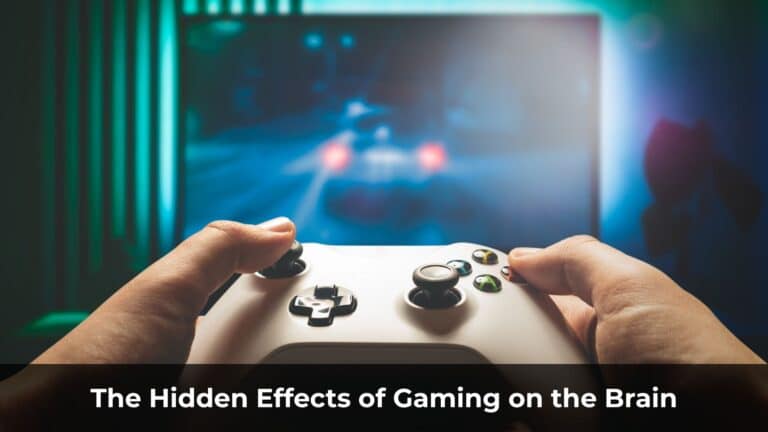“I don’t want you to reach 45 and only then begin to understand how the world really works. By that point, it may already be too late.”
This isn’t a threat. It’s a wake-up call — directed at young men stepping into adulthood with vague ambitions, no clear direction, and minds clouded by constant distractions.
Modern life is like a game — but no one hands you the rulebook. No one gives you a map. You just stumble through it, falling, getting lost, and hoping you figure it out before it’s too late.
Fortunately, some have gone before you. They’ve made the mistakes, paid the price, and come back to share a few cheat codes — shortcuts to help you move faster, wiser, and with fewer regrets.
Here are seven lessons that many men only understand when it’s far too late.
If you’re reading this while you’re still young, consider that a privilege — because learning these now could take you much further than most.
Note: This article uses direct language for clarity and reflection. It’s not meant to judge or assume — but to offer honest thoughts that may resonate with those navigating similar challenges.
Table of Contents
ToggleLesson 1: Porn Is Quietly Making You Weaker
Men have always had desire — that’s nothing new. But the rise of the internet, and platforms like PornHub, TikTok, Instagram, and OnlyFans, has taken it to an entirely new level.
With just a few taps, you can “satisfy” any craving.
No effort. No real connection. No need to grow as a man.
But here’s the truth: every time you give in, a part of your masculinity erodes.
The more you indulge, the less control you have. And when you lose control over your own desires, you lose the core of masculinity itself — initiative, discipline, and inner strength.
In a survey of 1,000 men, over 50% admitted to experiencing deviant or even dangerous urges — such as frotteurism (gaining sexual pleasure by rubbing against strangers in public).
This isn’t just an individual issue. It’s the byproduct of a hypersexualized generation — exposed too early, too often.
The Roman philosopher and emperor Marcus Aurelius once wrote:
“Uncontrolled desire is a sign of weakness.”
He had power, money, and access to women — yet he believed self-mastery was the highest virtue.
You might think: “Is it really that serious?”
Yes, it is.
Because if you’re a young man who can fully control his body, his urges, and his mind — you’ll have an unfair advantage over 90% of others who are driven by impulse.
Start today.
Don’t wait until it’s too late to realize what you’ve already lost.
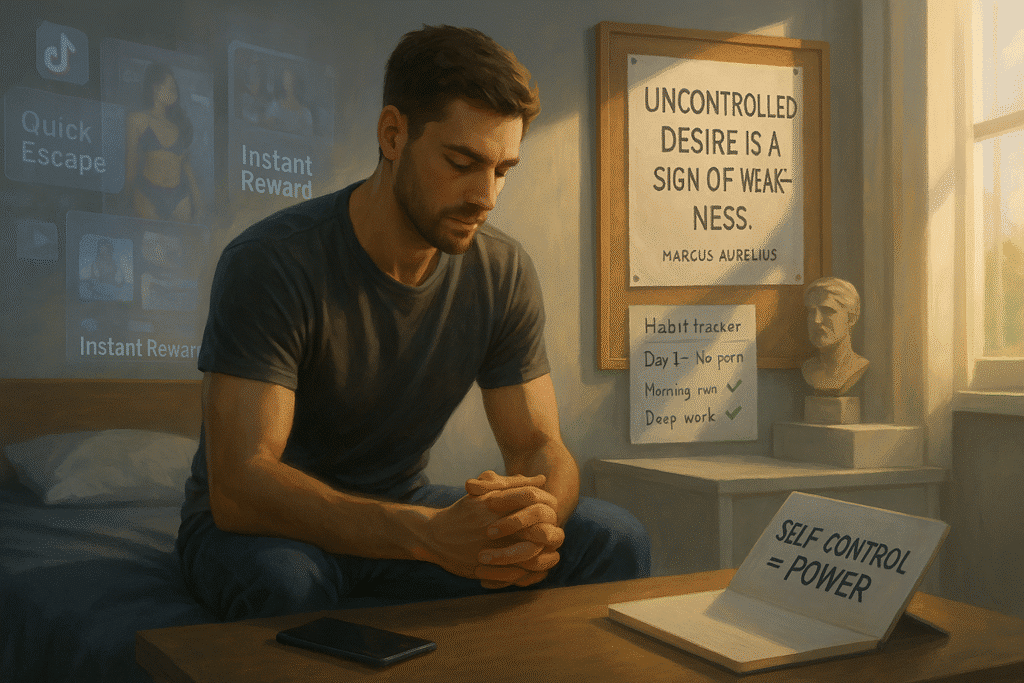
Lesson 2: Testosterone Is Your Power Source — And You’re Losing It Every Day
It’s not money. It’s not luck.
A man’s real strength often comes down to one thing: testosterone.
This single hormone affects far more than people realize. It fuels your ability to take action, builds natural confidence, helps you gain muscle and stamina, strengthens your bones, and even shapes your mental clarity and sexual energy.
But here’s the problem — and it’s serious:
Testosterone levels in men have been dropping by 1% every year for decades.
You probably have less testosterone than your father. And your son may have even less than you.
Why is this happening?
Modern lifestyle is the culprit.
We eat more than ever — but move less than ever.
In some countries, over 70% of the population is overweight or obese. And that’s not just about appearance. Excess fat raises estrogen — the female hormone — and that directly suppresses testosterone.
The body reflects the lifestyle. And testosterone reflects the cost.
You’re not as strong or as driven as you think you should be.
Instead, you’re becoming softer — tired, unmotivated, stuck in cycles of distraction and delay.
And the worst part?
You might not even realize it’s happening.
Look to the Men Who Came Before Us
Let’s rewind for a moment.
Back in the day, men didn’t have fancy gyms, protein shakes, or calorie-tracking apps.
But they were still strong.
They had lean, capable bodies and high energy — because they moved every day, did physical labor, ate just enough, and didn’t live in excessive comfort.
And today?
We eat more, sit longer, sleep later, and barely move at all.
In the 1960s, American high school boys were required to pass basic physical fitness tests. These weren’t for athletes — they were the baseline for every young man.
The tests included:
- Push-ups
- Sit-ups
- Long-distance running
- Standing broad jump
- Pull-ups on a bar
The goal was simple: to ensure that every boy had the physical foundation to take ownership of his life.
Now ask yourself: if you had to take those tests today, would you pass?
If the answer is no, there’s a good chance your testosterone — and your overall vitality — needs serious attention.
This isn’t about shaming anyone.
It’s about recognizing the problem — and doing something about it.
No Supplements. No Hacks. Just a Healthy Life
If you want to reclaim your natural masculine strength, it only takes three things:
- Eat less, and eat clean
- Move consistently, with a focus on strength training
- Sleep well, and manage your stress
That’s it. No complicated formulas. No secret tricks.
Just you — and the choices you make each day.
You don’t need to “become a strong man.”
You just need to return to who you were, before modern life started dragging you down.
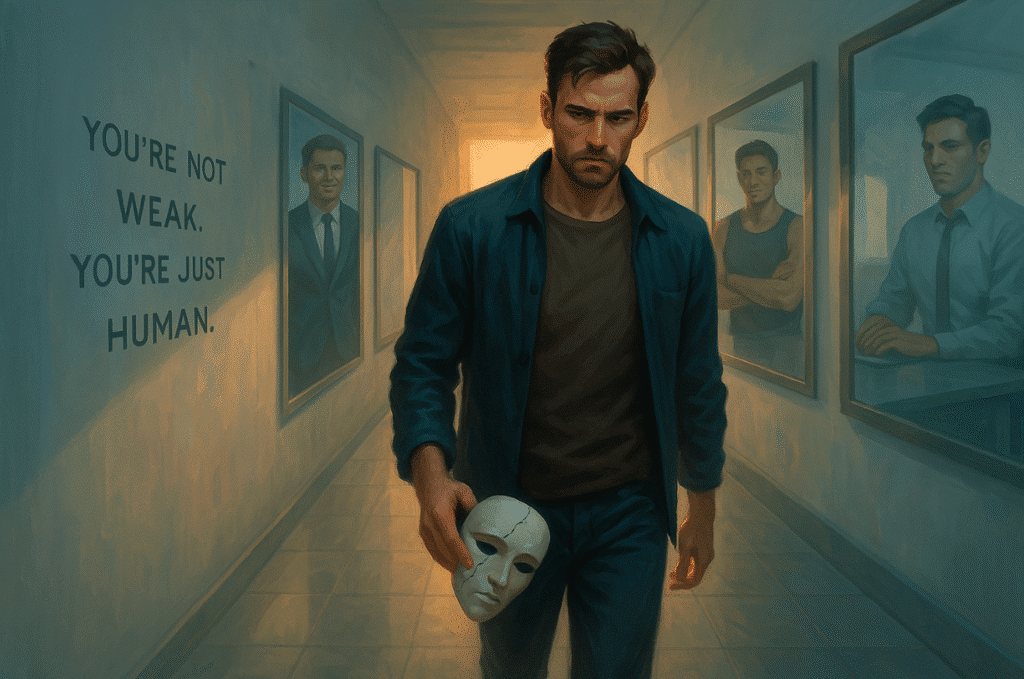
Lesson 3: Ignoring Your Mental Health Is a Dangerous Mistake
Most grown men never ask themselves:
Am I okay?
Really okay?
Instead, you stay silent.
You keep pushing.
You meet deadlines, solve problems, pretend everything’s fine — while inside, your mind feels like a guitar string pulled too tight for too long.
Here’s the danger: Society applauds men who are quiet, stoic, and never complain.
But what most people don’t realize is that this kind of “okay” is exactly why men die by suicide at far higher rates than women.
Modern men are ending their lives more often than soldiers returning from war.
Even in the U.S. — with one of the most advanced mental health systems in the world — male suicide rates are higher today than after World War II or the Great Depression.
Not because these men are weak.
But because no one taught them how to release the pressure.
No one gave them the space to say: “I’m tired. I need help.”
“Just hang in there. Tough it out. Be a man.” That’s what we’re told.
We’re taught to be strong, to control our emotions, to never show cracks.
But here’s the truth: Avoiding emotions isn’t strength. It’s a sign of being stuck.
You might perform like a machine — but you’re not one.
You’re human. And humans need to be seen, heard, and healed.
If you’ve had days where you can’t get out of bed, feel useless, drained, or just numb — don’t ignore it.
It’s not laziness. It’s a warning sign.
So how do you begin to heal?
Not everyone needs a therapist. But everyone needs to talk.
- Write down what’s been weighing on you.
- Talk to a friend — not to be fixed, but to be heard.
- If there’s no one to talk to, talk to yourself.
Record a voice memo. Journal. Breathe. Whatever helps you face the emotions instead of running from them.
Heck, even talk to ChatGPT — AI can be a surprisingly honest mirror when no one else is around. Treat it like a real advisor.
And if you feel like you truly need help, don’t hesitate to seek professional therapy.
Therapy doesn’t make you weak. It helps you rebuild your strength.
Caring for your mind doesn’t make you less of a man — it makes you the kind of man who can actually endure.
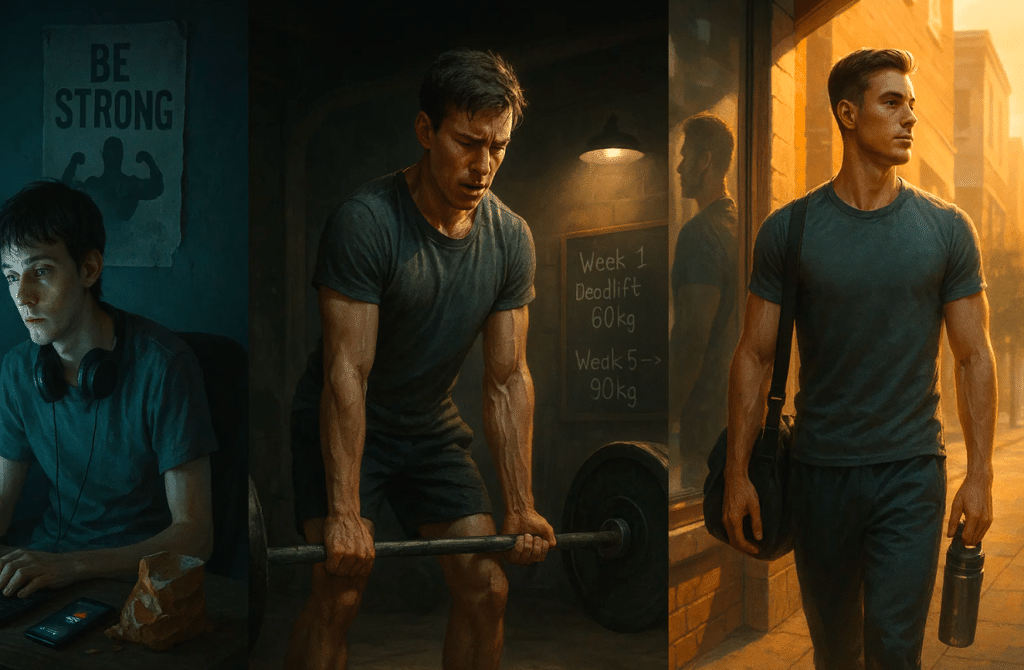
Lesson 4: A Strong Body Builds a Strong Mind
There’s a reason people say:
“A healthy body is the best home for a powerful mind.”
Feelings of weakness, fatigue, and low confidence often don’t come from a “negative mindset.” They come from a weak body — one that hasn’t been moving, sweating, or challenged in any real way.
The Physically Weakest Generation in History?
Here’s a statistic that should alarm you:
A U.S. study found that the average grip strength of millennial men has dropped by 22% compared to their fathers’ generation.
And it’s not just about hand strength.
It’s a signal of decline — in both physical and mental resilience.
There was a time when a man could proudly say:
“I can carry a bag of cement on my shoulder.”
Today?
Many men spend their entire day in front of a screen. No sports. No physical labor. No movement.
And over time, something begins to fade. Not just strength — but identity.
They stop feeling like men — at least in the primal, instinctive sense of the word.
Lack of Strength = Lack of Confidence
Here’s another surprising fact:
Only 2% of men aged 18 to 24 describe themselves as “fully masculine.”
What does that tell us?
- They don’t feel strong.
- They don’t feel in control of their bodies.
- And deep down, they don’t believe they measure up to the idea of being “a real man.”
This isn’t about looks. It’s an identity crisis.
Start at the Gym — or Anywhere You Can Lift
You don’t need to train for six-pack abs.
You train to:
- Feel yourself pushing past a new weight
- Watch your body grow stronger week after week
- Know — deep down — that you’re building not just muscle, but mental resilience
Because physical strength pumps confidence back into your mind.
Every time you look in the mirror after a workout — shirt drenched, arms shaking — there’s one voice that speaks louder than the rest:
“I’m in control of myself.”
Training isn’t just for your muscles. It’s for your character.
Still hesitating to start?
Ask yourself this: Do you want to keep living like this — easily shaken, unsure of yourself, and always on edge when pressure hits?
Or do you want to grow stronger — in body and mind — so you can face life with solid footing and steady hands?
The choice is yours.
But here’s something I know for sure: No man has ever regretted building a stronger body.
You don’t have to be massive.
But you do need to be strong enough — to carry your own life.
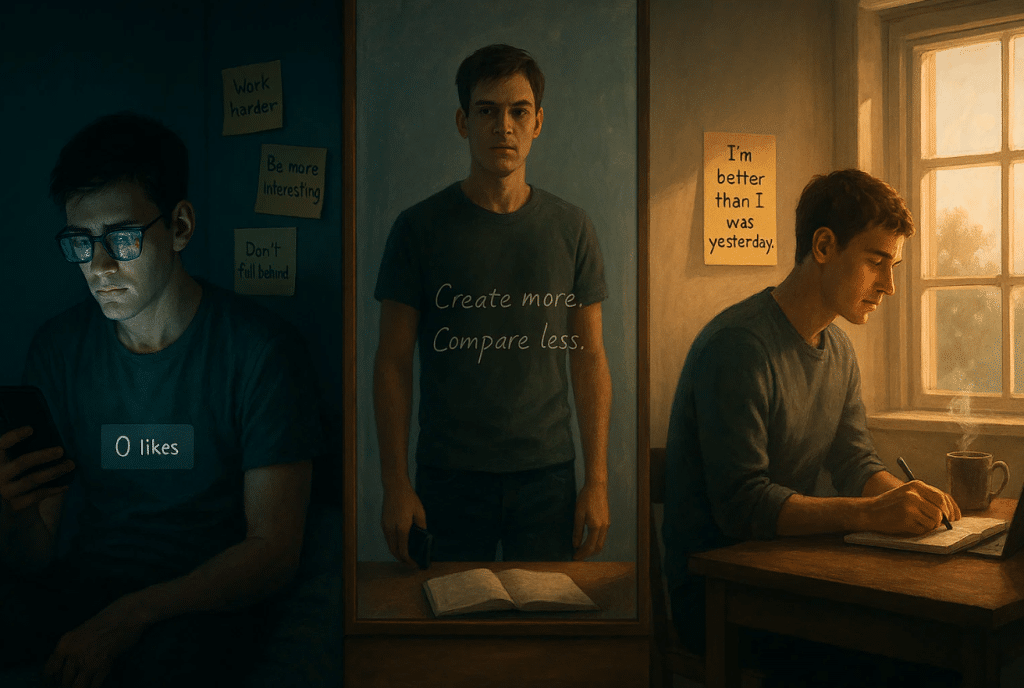
Lesson 5: Don’t Depend on Validation
You post a photo. No one likes it.
You feel… disappointed.
You do something good — no one notices.
You feel… deflated.
You work hard, but then scroll past someone with a “perfect” life online.
You feel… inadequate.
Welcome to the age of external validation.
In psychology, external validation means this: You only feel worthy when others approve of you. It’s common — and dangerously addictive.
Because once you crave approval, here’s what happens:
- Criticism hits you harder
- Compliments start to control you
- You slowly lose the ability to judge your own worth
Instead of asking, “Am I doing the right thing?” You wait for someone else to say: “You’re amazing!” — before you believe it’s true.
Social Media Is a Distorted Mirror
You spend hours scrolling Facebook, TikTok, Instagram…
You see people traveling, succeeding, falling in love, glowing with happiness.
And you?
You feel like you’re falling behind. Like your life doesn’t measure up.
But here’s the truth: You’re comparing your behind-the-scenes to someone else’s highlight reel.
You only see what they choose to show — not what they’re hiding.
You start to doubt your own life… Because of a filtered image, perfectly staged.
Research reveals something powerful:
- People who passively consume content (scrolling without posting) are more likely to experience depression and low self-esteem
- People who create content (posting, sharing, expressing) tend to have higher self-worth
Why? Because when you only consume, you compare.
When you create, you express.
That’s the difference between someone who’s always affected — and someone who knows who they are.
How Do You Reclaim Your Inner Strength?
It’s simple:
Create more — and compare less.
Share what you’re doing. Share what you believe. Share what you’ve learned.
Don’t wait for applause. Practice speaking your truth.
Limit your time passively scrolling. Instead of watching others, create something small — a note, a post, a short reflection.
You don’t need validation from the whole world. You just need to know one thing:
“I’m on the right path. I’m better than I was yesterday.”
Self-worth doesn’t come from praise.
It comes from knowing who you are — And continuing to move forward, even when no one’s clapping.
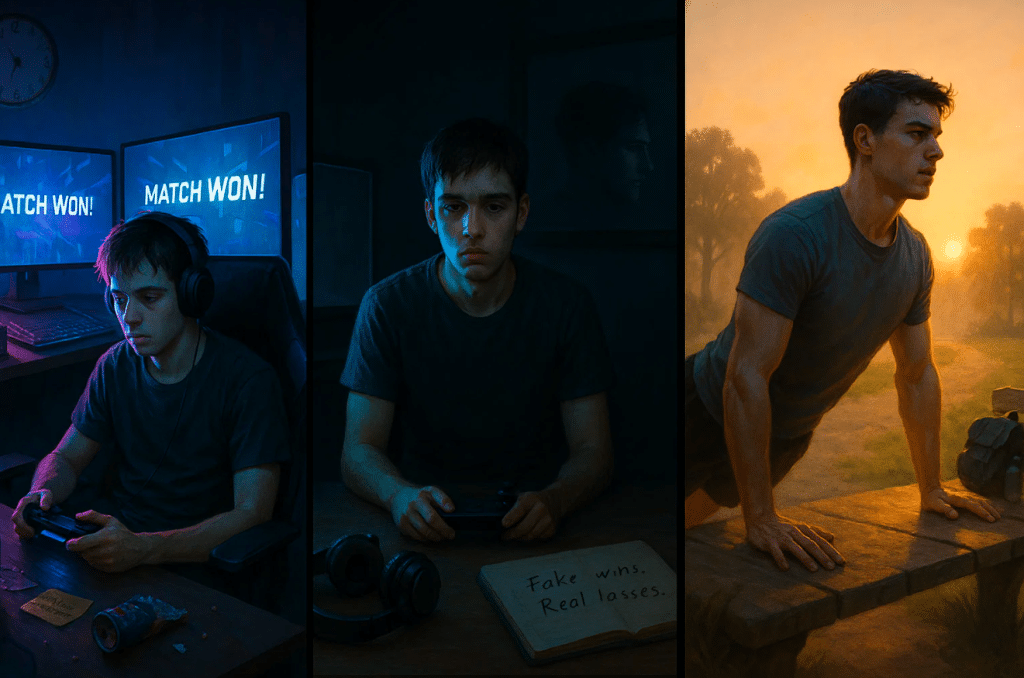
Lesson 6: Gaming Addiction is Killing Your Real Motivation
Let’s be honest: You told yourself you’d just play one match. But two hours flew by.
Your entire evening disappeared into a blur of victory sounds and glowing screens.
And you call that… “relaxing.”
The problem is: You don’t even know what you’re “releasing” — or what you’re accumulating in return.
Gaming: Where Your Brain Gets Tricked Every Day
Every time you play, your brain releases dopamine — the “feel good” chemical that makes you feel excited, accomplished, and rewarded.
And dopamine? It’s addictive.
The more you play, the more you crave that next “hit.” That little rush of virtual success.
But here’s the catch: Games give you dopamine without real effort — and that’s what makes them dangerous.
It’s fake dopamine.
You feel like you’ve “achieved something”… But in reality, no skills were built. No real value was created.
The Damage Goes Beyond Your Brain
Did you know? The World Health Organization (WHO) officially classifies gaming addiction as a mental health disorder.
Why?
Because excessive gaming leads to:
- Long hours of inactivity → higher risk of obesity, diabetes, heart disease
- Sleep disruption, irritability, anxiety
- A gradual loss of interest in the real world
- Lower testosterone levels — a serious issue for men
One study found that just 2 hours of gaming per day can significantly increase symptoms of depression.
You might not notice it right away. But over time, you’ll feel the shift:
- Struggling to get out of bed
- Avoiding social interaction
- Losing interest in work, school, even relationships
You Must Take Back Control
I’m not saying you have to give up gaming forever. The real issue is how much and how you play.
Here’s a simple plan:
- Limit daily game time (e.g., 30–60 minutes at a set time)
- Check in with yourself afterward: Do you feel recharged or drained?
- Trade some of that gaming time for real-life value: exercise, reading, writing, learning a new skill, or meeting up with real people
Even cutting back just a few hours a week gives you time to start building a stronger real-life version of yourself.
The virtual world might offer you the illusion of victory — But only the real world can give you true wins.
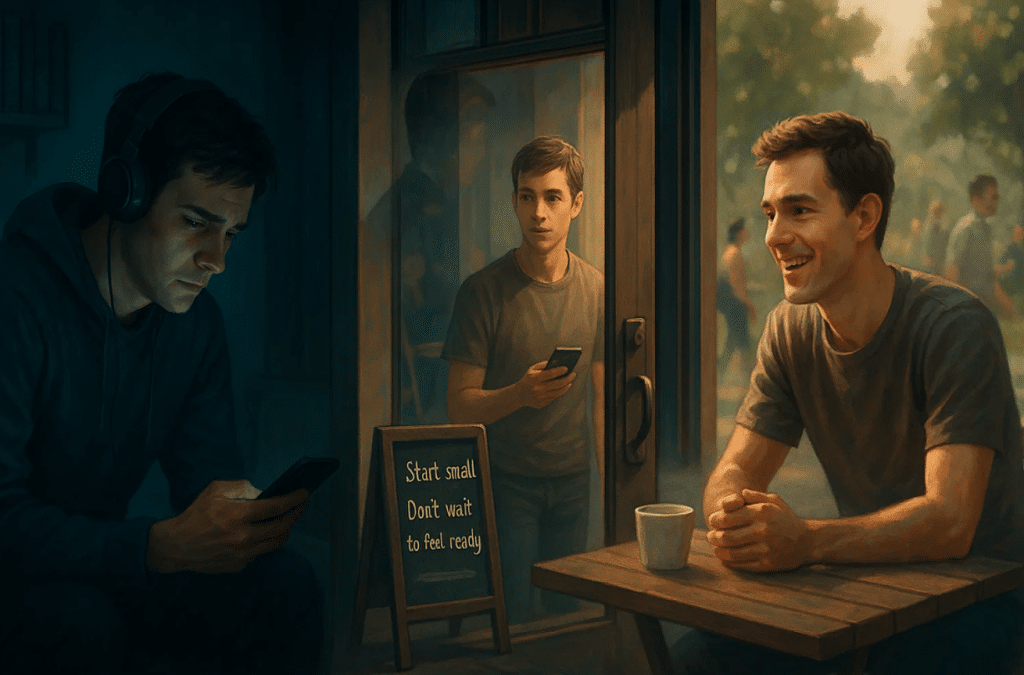
Lesson 7: Hiding Behind “Being an Introvert” Could Be Holding You Back
There’s a growing trend these days:
More and more young people label themselves as introverts — using it as a kind of protective shield.
They say things like:
- “I don’t like crowds.”
- “I’m not good at talking to people.”
- “I prefer to work alone.”
Sounds reasonable, right? But here’s the truth:
You’re probably not an introvert — you’re just afraid.
You’re Avoiding, Not Understanding Yourself
Social interaction makes you anxious. Starting a conversation with a stranger makes your heart race.
You fear rejection, judgment, and awkward silence. So instead of confronting that fear, you rationalize it: “This is just who I am.”
But here’s the reality:
Social skills are like muscles — if you don’t train them, they weaken. The more you avoid people, the harder it becomes to connect.
The longer you stay silent, the harder it is to speak up.
And then one day — when you need others to collaborate, to love, to build a business — You won’t know how to begin.
Extroverts Aren’t “Better” Than You — They’re Just Braver
Research shows: People with strong social skills earn, on average, over $500,000 more throughout their careers than those who keep to themselves.
Why?
- They communicate well → people like them
- They connect easily → more opportunities
- They build networks → more influence
You don’t need to become the loudest, funniest, or most charismatic person in the room.
But you do need to understand this: Stay silent for too long… and you start to disappear.
Start Small — Don’t Wait to “Feel Ready”
Stop waiting for the perfect mood to strike.
Take action — because action is what builds confidence.
Here’s a simple, real-world exercise:
Open your contacts or Instagram follow list. Pick 10 people you used to know — classmates, coworkers, old friends
Send a quick message like: “Hey! How have you been lately?” “I’ve been wanting to reconnect with a few people — are you free to catch up sometime this week?”
You’ll be surprised:
- A few might not reply
- A few will be genuinely happy you reached out
- And most importantly — you’ll have won a battle against yourself
Next, make it a habit to meet up: coffee, lunch, a walk. Just once or twice a week.
Soon, you’ll notice your social skills improving — naturally and consistently.
Talent can get you started. But social skills are what take you far — and keep you from walking alone.
Final Thoughts…
Some of life’s lessons come early — but we’re not clear-headed enough to recognize them.
Others arrive too late — after we’ve already paid the price in health, time, or even self-respect.
But if you’ve made it this far, it means one thing: You’re still on the journey of awakening.
And for someone who’s willing to grow — it’s never too late.
These 7 lessons aren’t absolute truths. They’re not “hacks” or guaranteed paths to success.
They’re simply honest reflections — meant to help you live more deliberately, stand more firmly, and look back with fewer regrets.
No one can live your life for you. No one can learn on your behalf.
But some lessons — if learned early — can take you much further.
Because the journey of becoming a real man doesn’t begin with pretending to be strong.
It begins with looking inward — and having the courage to change.
